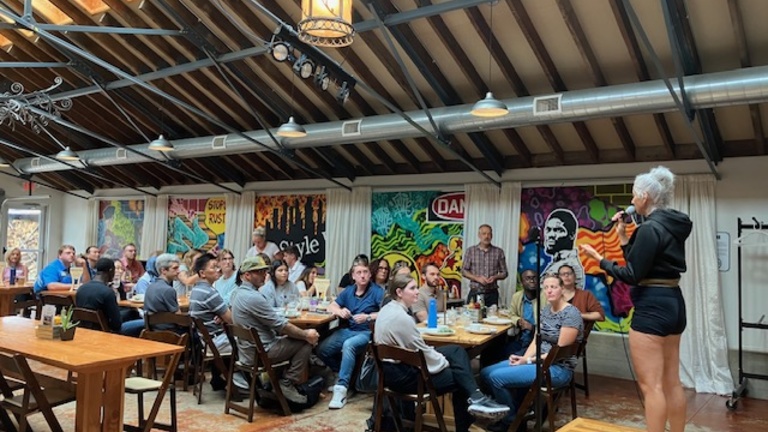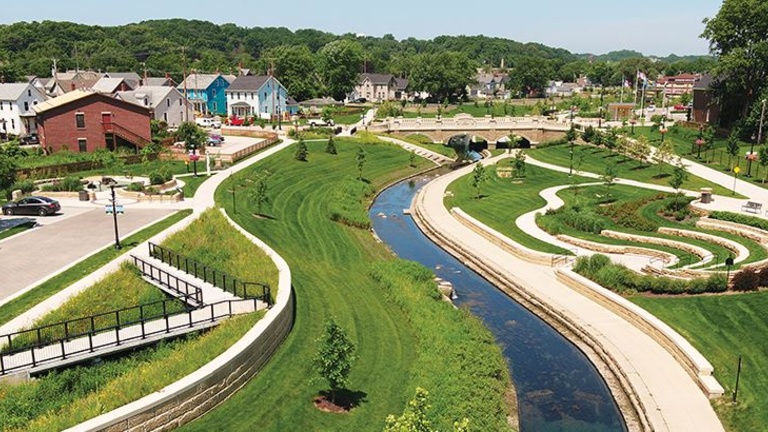When the University of Iowa’s Initiative for Sustainable Communities (IISC) visited Dubuque in early September, the day was filled with surprises. The group of 21 students and faculty were welcomed by Mayor Brad Cavanagh, a former therapist and UI alum who arrived by bicycle (and no, not an e-bike, which is saying something in this city of hills). They took a city tour that included visiting the Port of Dubuque where a WWII era ship was anchored and then saw the world’s shortest and steepest railroad. At Convivium, a nonprofit restaurant and collection of neighborhood gardens, they were treated to lunch and a talk by the organization’s co-founder Leslie Shalabi.
Dubuque is one of two IISC partners for the 2023-24 academic year. The other is Bondurant in Polk County. The city, which is the oldest in the state was IISC’s first partner back in 2011 when the experiential program first started. In the decade since, Dubuque has established itself a sustainable leader in the region. Many of the projects that approximately 100 UI students and faculty will undertake this year reflect that emphasis.
Transportation and housing anchor planning students' work
Planning graduate students will spend the next nine months creating an alternative transportation action plan that brings together diverse transportation-related needs and goals into a single document. The plan will move the community beyond broad goals toward feasible and focused actions over the next five years that will help the city reduce vehicle dependency and promote accessible and equitable transportation alternatives.
A second team of planning students are focused on affordable housing. During the kickoff event, they met with the city housing director, Alexis Steger, and saw some of the kinds of housing in city and learned of inherent problems.
“There are [rental]vacancies, but there’s also a gap between what is available and what people can actually afford,” said MPA candidate Kaylynn Sieverding. “I’m excited about where the team can go with what Dubuque already has in place,” she added.
The humanities now part of IISC community

Also attending the kickoff were graduate students in the Division of World Languages, Literatures and Cultures who will address language justice and climate. They are part of a new humanities lab course that was initiated by Humanities for the Public Good, an Obermann Center-funded initiative. Two marketing undergraduates met with transportation experts to think about how best to encourage use of e-bikes and scooters by visitors and residents alike. And public affairs students toured the public library and heard about challenges faced by the staff as they negotiate the needs of visitors from the general population with those of under-housed patrons who rely on the public institution for daily shelter and stability.
“Dubuque is an inspiring place,” says IISC director Travis Kraus. “I know we’ll be able to help the city move some of its goals forward while also learning from their innovative team.”

Watershed has gone from problem to city gem
A great example of this are the green alleyways the city has championed. It is about one-third of the way toward its goal of creating 240 green alleyways, which entails removing asphalt and cement and replacing it with permeable pavers. The green alleyways reduce stormwater run-off, while also replenishing groundwater and helping prevent pollutants on roadways from running off into the storm sewer system and ultimately to our rivers.
Many of the green alleyways are on the Bee Branch, a watershed that had been prone to excessive flooding. For nearly a decade, the city has been implementing various large projects to mitigate flooding. The IISC group visited Bee Branch Creek Causeway, a beautiful green space that runs along the creek and includes pollinator plantings, a community orchard, and ways for children and others to play and recreate. Jamie Weinfurther, an MFA candidate in the School of Art and Art History, is working with a local elementary school that abuts the park to create sculptures from recycled playground equipment.
To learn more about all of the projects happening in Dubuque this year, visit: https://iisc.uiowa.edu/partners/dubuque